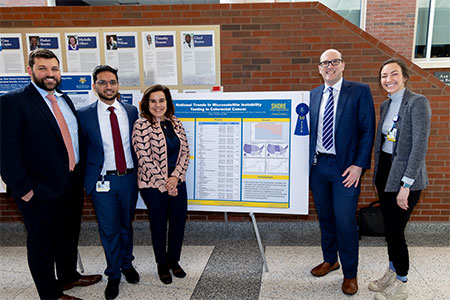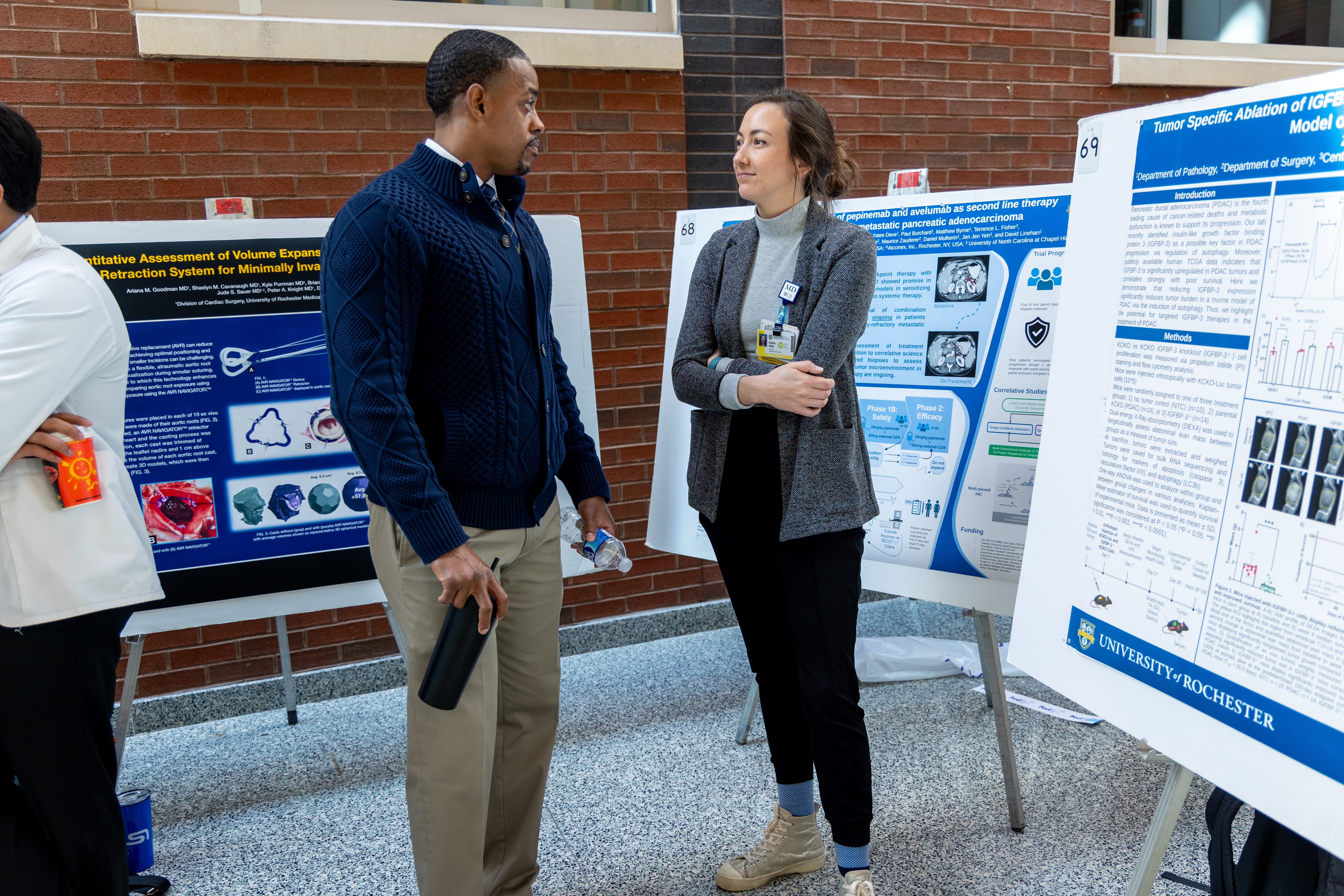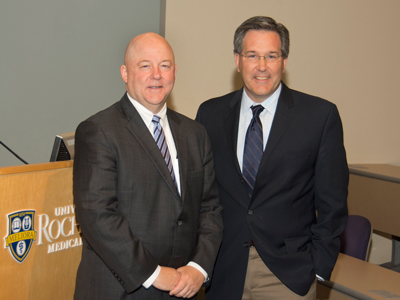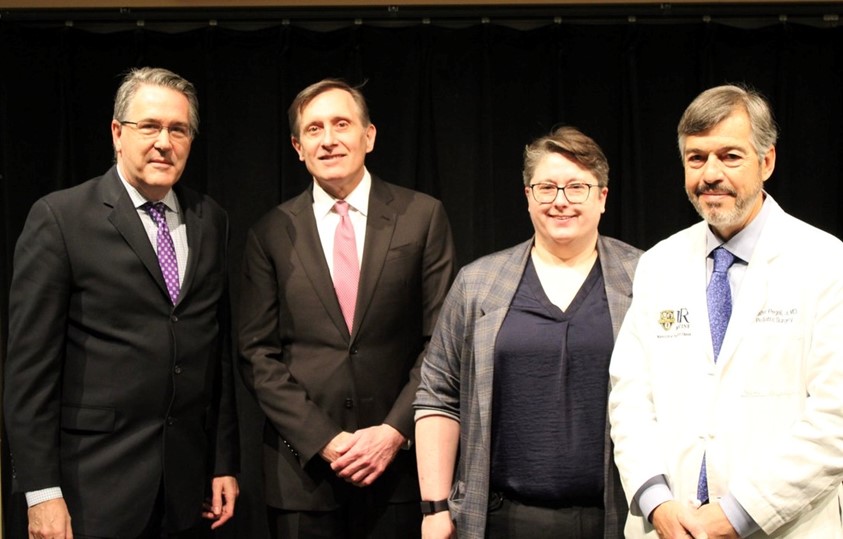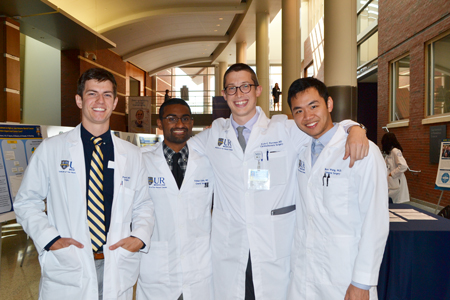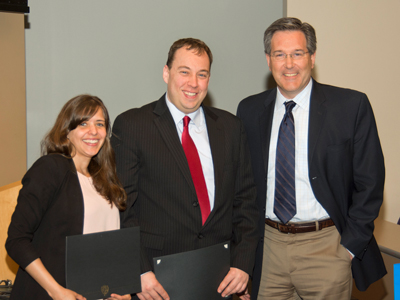Research within the Department of Surgery encompasses a wide and growing range of disciplines and opportunities. Just a few examples include positions in clinical and outcomes research through the Surgical Health Outcomes & Reaching for Equity (SHORE) program, translational research in the Engineering & Clinical Laboratory for Innovation in Pediatric Surgery (Wilson ECLIPSe Lab) and the Cardiovascular Engineering Lab, and basic laboratory science in the Center for Tumor Immunology Research.
While research during surgical residency years is optional, the majority of residents take advantage of the opportunity to expand their academic pursuits for career advancement. In addition to traditional research experiences, our residents have pursued additional degrees and other academic advancement opportunities. For example, there are opportunities to pursue a Masters of Public Health (MPH) degree, a Master of Science in Clinical Investigation, or to pursue a M.S. degree in Biomedical Engineering through the Center for Medical Technology & Innovation (CMTI).
The research and career development opportunities available for residents during training at the University of Rochester are diverse. Many general surgery residents spend between one and three years of dedicated research time during their residency training between their PGY 2 and PGY3 years, but scheduling of this experience is flexible. If you have a passion, we will work with you to try to make it happen. Whether your interests lie in molecular or cell biology, surgical simulation, resident education, cancer outcomes, population health sciences, systems analysis or any other surgical discipline, we will work together to design a research/career development experience with outstanding mentors. Our goal is for our trainees to be prepared to be the leaders in the next generation of academic surgery. The Associate Program Director for Research is actively involved with each resident to explore their personal goals and to help build an individualized path for every resident.
The research mission of the General Surgery Residency Program is accomplished within the context of the University of Rochester's peer review-funded basic science and clinical research programs. The University ranks in the top third of medical schools with NIH peer review grant funding. A particularly unique resource in our department is the Wilmot Cancer Institute’s Cancer Control and Psychoneuroimmunology Lab (CCPL) led by Michelle C. Janelsins-Benton, Ph.D., with world-class opportunities for scholarly pursuits to investigate cancer-related side effects. Wilmot is one of only two academic cancer centers in the U.S. to be chosen by the NCI as a research hub for the NCI Community Oncology Research Program.
Importantly, funding is available for laboratory expenses and salary for residents during their research years. Many surgical sections have funding to support residents performing specialized clinical and basic science research within their division. As part of their research training, all residents will learn grant writing skills and have the opportunity to present their work at local and national meetings. Residents are also eligible to apply for loan repayment programs through the National Institutes of Health, which may yield an additional $50,000 a year for each spent in laboratory research, in addition to regular salary support. Residents are also free to moonlight during the research years, provided it does not interfere with their research responsibilities.
Our annual Department of Surgery Research Symposium brings in fascinating keynote speakers who share their research and spend time discussing the unique opportunities and challenges of the surgeon-scientist with residents and other trainees. The Research Symposium is followed by an abstract competition in which residents have the opportunity to present their research and a research fair highlighting poster presentations from the Department of Surgery. Awards are available to the residents whose presentations and posters are scored the highest.
To learn more about our surgical research residents, check out our Research Resident Spotlight.
Research Residents
Megan Boyer, M.D.

Research Interest
Clinical health outcomes and disparities within SHORE (Surgical Health Outcomes & Reaching for Equity). Currently engaged in projects centered around ostomy creation secondary to a variety of colorectal disease processes, timeline to restoring continuity, the system-based issues that delay this process, and downstream health implications of delay at the local, state, and national levels.
Matt Byrne, M.D.

Research Interest
Basic science, translational research and outcomes research in transplant oncology and solid tumor immunology. My work includes preclinical models in liver cancer, translational discovery of surgical explants, and multi-institutional collaborations to understand outcomes in transplant oncology.
Shaelyn Cavanaugh, M.D.

Research Interest
Luke Cybulski, M.D.
 Research Interest
Research Interest
Totadri Dhimal, M.D.

Research Interest
Clinical outcomes research at SHORE (Surgical Health Outcomes & Reaching for Equity), with a focus on healthcare disparities, perioperative care, and surgical outcomes. Currently, we are working on building a body of work centered around incarcerated patients, examining their surgical care and outcomes through innovative methodologies and the creative utilization of a large database. With this, we aim to study a population that has been historically challenging to research due to their status and underrepresentation in standard studies.
Bailey Hilty, M.D.

Research Interest
Basic science and translational research in preclinical models exploring the interaction between the tumor microenvironment of pancreatic adenocarcinoma and the immune system to develop novel therapeutic strategies.
Marie (Molly) Jacobs, M.D.

Research Interest
SHORE: Research focusing out outcomes in Thoracic surgery and improving the efficiency of healthcare delivery.
Joel Kruger, M.D.

Research Interest
Vascular Surgery: Clinical Research Fellow with the Department of Vascular Surgery focused primarily on Health Science Research, with a particular emphasis on carotid and aortic diseases. He is leveraging his background in biostatistics and Geographic Information Systems to advance understanding of how to improve surveillance programs and study the impact of disparities on access to vascular surgical care.
Abigail (Abby) Loszko, M.D.

Research Interest
Pediatric Surgery: As a member of the ECLIPSe (Engineering & Clinical Laboratory for Innovation in Pediatric Surgery) lab, my primary focus is on Social Determinants of Health and how they impact clinical outcomes. This includes assessing the utility of current area-level deprivation indices in the pediatric surgery population to better predict which patients are at higher risk for unfavorable outcomes.
Chelsea Marin, M.D.

Research Interest
Basic science and translational research in pre-clinical models of pancreatic ductal adenocarcinoma and cholangiocarcinoma, with a specific emphasis on the interaction between the tumor microenvironment and the immune system to develop new therapeutic options for treatment of these cancers.?
Korry Wirth, M.D.

Research Interest
Use of Photodynamic Therapy to Treat Intra-Abdominal Contamination in General Surgical Conditions. This is a multi-faceted project where our objective is to demonstrate that PDT is a novel treatment for intra-abdominal contamination.
Sam Wu, M.D.

Research Interest
Pediatric Surgery: Research fellow at Morgan Stanley Children’s Hospital, New York in the Division of Pediatric Surgery with clinical re-search projects focused on complex congenital conditions including congenital diaphragmatic hernia, congenital lung malformations, and prospective studies in fetal therapies and pediatric trauma and critical care.


